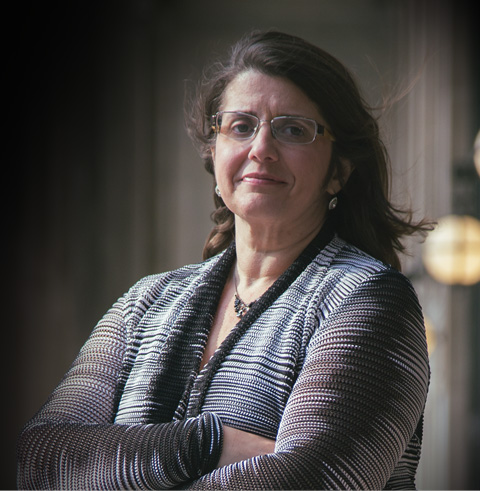
The PeopleWill Prevail
F
or Carolyn Shapiro, Chicago-Kent College of Law associate professor, the words “we the people”—the same words that begin the United States Constitution—seem to define her life.
Even before she entered law school, Shapiro knew that she wanted to assist people in ways that were impactful and lasting. She first thought about a career in social services. After college she worked for Jewish Vocational Services and for what is now Illinois Action for Children, advocating for affordable quality child care for low-income and working families. As she became more involved in advocacy and policy issues, she pursued both a master’s degree at the University of Chicago Harris Graduate School of Public Policy and a juris doctor at the University of Chicago Law School, which is where she discovered her passion for constitutional law.
“I’m interested in the commitments we make to each other as citizens of the same country, as members of the same polity,” she says. “I’m interested in how we navigate our differences.”
After graduation she clerked for Supreme Court of the United States Associate Justice Stephen G. Breyer and also former Chief Judge Richard A. Posner of the U.S. Court of Appeals for the Seventh Circuit, who retired in 2017. She says that her year clerking for Breyer, who was then relatively new to the Supreme Court, gave her much insight on what makes for a good justice and how the U.S. Constitution should serve as the country’s “rules of the road.” Shapiro returned to Chicago as a Skadden Fellow in public interest followed by a job with the civil rights firm Miner, Barnhill & Galland, where she became acquainted with fellow attorney and state senator Barack Obama.
After spending one year as a visiting professor at Chicago-Kent, Shapiro became a tenure-track faculty member in 2004. Even within the classroom setting, she continued her efforts for the people. Shapiro says that one reason she has been so fortunate throughout her career path is that most of her jobs have allowed her to have a meaningful personal life.
“As a law professor I try to be a role model for people who have families,” she says, describing her life with teenage sons, Jonah and Gabriel, and her attorney husband, Joshua Karsh. “I care a lot about issues related to work-family balance and have taught courses in this area because we as a society are still struggling with it.”
“As a law professor I try to be a role model for people who have families.”
—Carolyn Shapiro
In 2010 Shapiro founded the Institute on the Supreme Court of the United States (ISCOTUS), to promote education and dialogue about the Supreme Court. ISCOTUS, which Shapiro now co-directs with her Chicago-Kent colleague Christopher Schmidt, regularly partners with Constitutional Rights Foundation Chicago to provide programming for high school students and teachers. It also hosts speakers and symposia at Chicago-Kent. Shapiro is now a recognized scholar and Supreme Court expert whose opinions and comments are featured in both local and national media outlets, from WTTW’s Chicago Tonight to the Washington Post. She also blogs on ISCOTUS now and contributes to the Huffington Post as well as the American Constitution Society Blog.
“The Supreme Court is completely relevant today, incredibly important,” says Shapiro, noting the court’s involvement in the travel ban initiated by President Donald J. Trump and the ruling of marriage equality as the law of the land as required by the 14th Amendment.
“They approach these cases with a philosophy about the Constitution, how to balance competing interests and how to balance aspects of the Constitution that are in tension with each other. They also consider how to resolve ambiguity in the Constitution, of which there is plenty, and how to apply very general constitutional language to circumstances that nobody could have possibly anticipated when it was written or the amendments were written.”
This past March ISCOTUS held a program for high school students that featured the case of the U.S. Patent and Trademark Office (USPTO) vs. Simon Tam of the Asian-American band The Slants, who had petitioned the court to allow the band to register the name. The USPTO denied the request because it maintained that the name was derogatory to “persons of Asian descent.” Tam spoke to the students via Skype about why keeping the name was important to him. (In June the court ruled in favor of Tam.) This fall Shapiro also arranged for Supreme Court Associate Justice Elena Kagan—whom Shapiro describes as being an inspiration and “the best teacher I’ve ever had”—to speak at Chicago-Kent.
Kagan’s visit caps Shapiro’s return to the university after a two-and-a-half year hiatus (2014–16) as Illinois solicitor general, a position that allowed her to maximize her public service efforts. She reviewed the civil appeals and criminal appeals briefs filed in the Illinois Supreme Court, the U.S. Court of Appeals (Chicago), and the U.S. Supreme Court by the more than 40 attorneys representing the state. She herself filed briefs and argued on behalf of the state in the U.S. Supreme Court, the Illinois Supreme Court, and both state and federal courts of appeals. In 2017 Shapiro was also honored by the Chicago Lawyer Chapter of the American Constitution Society for Law and Policy with an Abner Mikva Award for advancing the progressive mission of the organization.
“In addition to her extensive depth of knowledge of the law and exceptional experience with the U.S. Supreme Court and the Seventh Circuit Court of Appeals, Carolyn brought a strong passion for public service to our office,” says Illinois Attorney General Lisa Madigan. “I was confident the people of Illinois would greatly benefit from her expertise and dedication to seeing that Illinois law was upheld for all residents.”